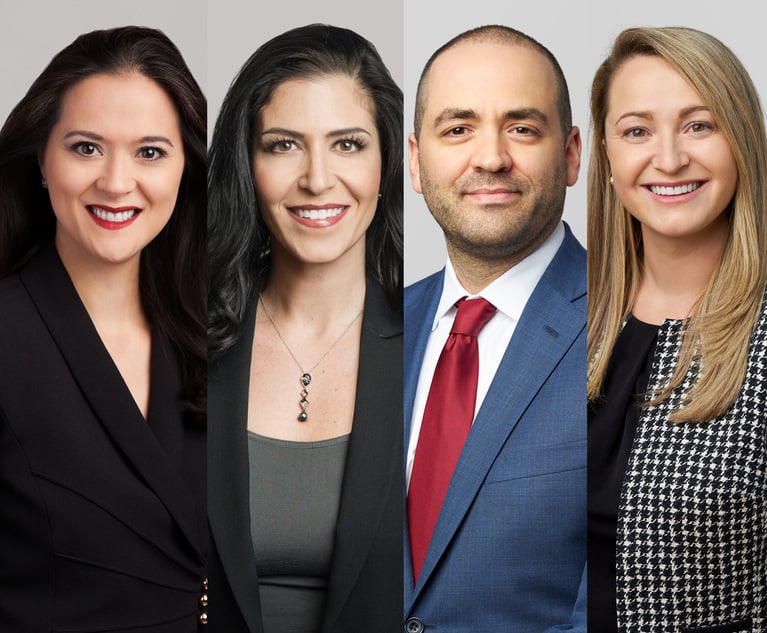Gestational Carrier Bill Clears Legislature
Twice-vetoed legislation that would sanction the type of surrogacy-for-hire contracts famously deemed unenforceable three decades ago in the state Supreme Court's In re Baby M case has now passed the Legislature.
April 13, 2018 at 09:39 AM
4 minute read

Twice-vetoed legislation that would sanction the type of surrogacy-for-hire contracts famously deemed unenforceable three decades ago in the state Supreme Court's In re Baby M case has passed the Legislature a third time.
Lawmakers were hardly unanimous on the issue. On Thursday, S-482 passed the Assembly by a vote of 51-16, with six abstentions. Earlier, on March 26, it passed the Senate 25-10. The votes were along party lines, with majority Democrats voting in favor, and Republicans voting against or abstaining.
S-482 could be met with a friendlier reception from new Gov. Phil Murphy, a Democrat, than its predecessors, which were blocked twice by former Gov. Chris Christie, a Republican.
The legality of such contracts has been a historically contentious issue in New Jersey.
Surrogacy arrangements made national headlines in 1988 when the state Supreme Court issued its watershed ruling in In re Baby M, which voided surrogacy-for-hire contracts. In that case, the mother initially agreed to carry the fetus to term and surrender the baby to the biological father and his wife, but had a change of heart—to which the court held she was entitled, given the public policy in favor of biological parents maintaining parental rights to their children.
But, as proponents of gestational carrier legislation in recent years have pointed out, science has advanced since Baby M, and a woman can carry a fetus with no biological connection.
In 2012, the court, in a 3-3 split in In the Matter of the Parentage of a Child by T.J.S. and A.L.S., let stand a lower court ruling that parental rights do not vest in the wife of a man who fathered a child through an anonymous egg donor, which was carried by an unrelated surrogate.
Baby M, meanwhile, has remained good law.
Christie vetoed the legislation in 2012 and 2015. Last year the measure once again passed the Senate, though the Assembly didn't take action before the close of the legislative session. In his 2012 veto, Christie said not enough research had been done to study the possible ramifications. “While some will applaud the freedom to explore these new, and sometimes necessary, arranged births, others will note the profound change in the traditional beginnings of a family that this bill would enact,” Christie said in a veto statement at the time. In his 2015 veto message, he said the sponsors had done nothing to allay his concerns since the prior attempt.
Sen. Joseph Vitale, D-Middlesex, a chief proponent, said in a statement earlier this year: “For men and women who are looking to start or expand their families but have struggled to do so through traditional means, gestational carrier agreements offer an alternative path to having children. Gestational carrier agreements are imperative to protect the interests of all parties involved, including the carrier, the intended parents, and the child. This bill will provide the legal framework for the agreements.”
The bill requires that a surrogacy contract clearly state that the gestational carrier would agree to undergo a pre-embryo transfer, attempt to carry and give birth to the child, and surrender custody of the child to the intended parent immediately upon the birth of the child.
Under the contract, the intended parent would have to agree to become the legal parent of the child immediately after the birth. The contract also would mandate that the child's birth certificate name the intended parent as the sole legal parent of the child.
The measure also would require that any agreement must allow for the gestational carrier to choose her own medical care for the pregnancy, labor, delivery and postpartum care.
Because the agreement would not be considered an adoption, a surrender of custody or a termination of parental rights, it would not be in conflict with New Jersey's adoption laws, the bill's authors contend. Also, the bill would allow for the intended parent to reimburse the gestational carrier's reasonable expenses in connection with carrying the child, including reimbursement for medical, hospital, counseling and living expenses during the pregnancy and postpartum recovery.
The intended parents would be responsible for paying the gestational carrier's counsel fees, but the gestational carrier would be able to choose the attorney. A gestational carrier would have to be at least 21 years old and have already had a child or children of her own.
This content has been archived. It is available through our partners, LexisNexis® and Bloomberg Law.
To view this content, please continue to their sites.
Not a Lexis Subscriber?
Subscribe Now
Not a Bloomberg Law Subscriber?
Subscribe Now
NOT FOR REPRINT
© 2025 ALM Global, LLC, All Rights Reserved. Request academic re-use from www.copyright.com. All other uses, submit a request to [email protected]. For more information visit Asset & Logo Licensing.
You Might Like
View All
On the Move and After Hours: Einhorn Barbarito; Gibbons; Greenbaum Rowe; Pro Bono Partnership
4 minute read

Engine Manufacturer Escapes Suit Over NJ Helicopter Crash That Killed Country Music Star
3 minute readTrending Stories
- 1ACC CLO Survey Waves Warning Flags for Boards
- 2States Accuse Trump of Thwarting Court's Funding Restoration Order
- 3Microsoft Becomes Latest Tech Company to Face Claims of Stealing Marketing Commissions From Influencers
- 4Coral Gables Attorney Busted for Stalking Lawyer
- 5Trump's DOJ Delays Releasing Jan. 6 FBI Agents List Under Consent Order
Who Got The Work
J. Brugh Lower of Gibbons has entered an appearance for industrial equipment supplier Devco Corporation in a pending trademark infringement lawsuit. The suit, accusing the defendant of selling knock-off Graco products, was filed Dec. 18 in New Jersey District Court by Rivkin Radler on behalf of Graco Inc. and Graco Minnesota. The case, assigned to U.S. District Judge Zahid N. Quraishi, is 3:24-cv-11294, Graco Inc. et al v. Devco Corporation.
Who Got The Work
Rebecca Maller-Stein and Kent A. Yalowitz of Arnold & Porter Kaye Scholer have entered their appearances for Hanaco Venture Capital and its executives, Lior Prosor and David Frankel, in a pending securities lawsuit. The action, filed on Dec. 24 in New York Southern District Court by Zell, Aron & Co. on behalf of Goldeneye Advisors, accuses the defendants of negligently and fraudulently managing the plaintiff's $1 million investment. The case, assigned to U.S. District Judge Vernon S. Broderick, is 1:24-cv-09918, Goldeneye Advisors, LLC v. Hanaco Venture Capital, Ltd. et al.
Who Got The Work
Attorneys from A&O Shearman has stepped in as defense counsel for Toronto-Dominion Bank and other defendants in a pending securities class action. The suit, filed Dec. 11 in New York Southern District Court by Bleichmar Fonti & Auld, accuses the defendants of concealing the bank's 'pervasive' deficiencies in regards to its compliance with the Bank Secrecy Act and the quality of its anti-money laundering controls. The case, assigned to U.S. District Judge Arun Subramanian, is 1:24-cv-09445, Gonzalez v. The Toronto-Dominion Bank et al.
Who Got The Work
Crown Castle International, a Pennsylvania company providing shared communications infrastructure, has turned to Luke D. Wolf of Gordon Rees Scully Mansukhani to fend off a pending breach-of-contract lawsuit. The court action, filed Nov. 25 in Michigan Eastern District Court by Hooper Hathaway PC on behalf of The Town Residences LLC, accuses Crown Castle of failing to transfer approximately $30,000 in utility payments from T-Mobile in breach of a roof-top lease and assignment agreement. The case, assigned to U.S. District Judge Susan K. Declercq, is 2:24-cv-13131, The Town Residences LLC v. T-Mobile US, Inc. et al.
Who Got The Work
Wilfred P. Coronato and Daniel M. Schwartz of McCarter & English have stepped in as defense counsel to Electrolux Home Products Inc. in a pending product liability lawsuit. The court action, filed Nov. 26 in New York Eastern District Court by Poulos Lopiccolo PC and Nagel Rice LLP on behalf of David Stern, alleges that the defendant's refrigerators’ drawers and shelving repeatedly break and fall apart within months after purchase. The case, assigned to U.S. District Judge Joan M. Azrack, is 2:24-cv-08204, Stern v. Electrolux Home Products, Inc.
Featured Firms
Law Offices of Gary Martin Hays & Associates, P.C.
(470) 294-1674
Law Offices of Mark E. Salomone
(857) 444-6468
Smith & Hassler
(713) 739-1250







